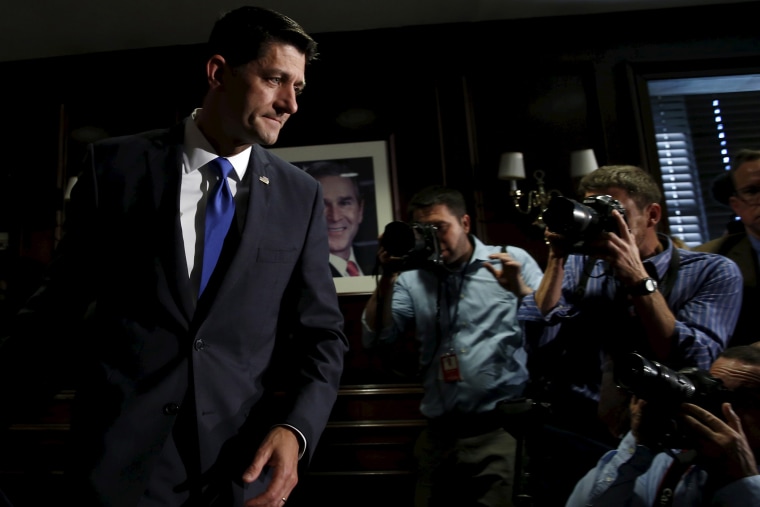House Speaker Paul Ryan (R-Wis.) delivered a speech last week at the Ethics and Public Policy Center's anniversary gala, and the Wisconsin Republican highlighted an interesting excerpt from the remarks on social media over the weekend:
"That is the key difference between ourselves and the progressives: We do not believe we should be governed by elites. We do not believe that there are experts or elites who should steer us in their preferred direction. We see that sense of organization as condescending, paternalistic, and downright arrogant. We know it's wrong. [...] "Because we believe that all of us are equal, we believe there is no problem that all of us -- working together -- cannot solve. We believe every person has a piece of this puzzle, and only when we work together do we get the whole picture."
The speech as delivered was slightly different from the speech as written, and some of the changes are notable.
Regardless, I found the speech interesting because it sheds light on Ryan's broader worldview and what he sees as the major points of contention in these divisive political times. What was challenging, however, was understanding the meaning of some of the Speaker's labels.
For example, what exactly is an "elite" and who believes we should be governed by them? Ryan didn't specify, though he did note that he supports the idea of crafting a health care reform plan that's guided by consumers guided by the free market, rather than relying on guidance from health policy experts at HHS.
In other words, Paul Ryan seems to have a problem with expertise. Indeed, he explicitly rejected the idea of "experts" helping guide policy debates.
And if the Republican Speaker believes this is an important difference between conservatives and progressives, he may be onto something.
Several years ago, David Brooks, lamenting the radicalism of congressional Republicans, complained that many on the far-right "do not accept the legitimacy of scholars and intellectual authorities." Five years later, there was Paul Ryan, effectively arguing that Brooks is right and conservatives shouldn't accept the legitimacy of scholars and intellectual authorities.
It's an embrace of a sort of clumsy intellectual populism in which "regular people" deliberately thumb their noses at experts because they're experts. The intellectual elites and their pesky reality-based worldview tell us that climate change is real, evolutionary biology is fact, and tax cuts don't pay for themselves, so to heck with those folks. Who needs a bunch of elitist egg heads steering debates, just because they have facts and evidence on their side?
At first blush, few would take issue with some of the broader principles Ryan spoke of last week. "All of us are equal"? Though I suspect there are some on the far-right who may take issue with the idea, it sounds great. All of us "working together" can solve any problem? Sign me up.
But it's the application of those principles where Ryan's vision starts running into practical problems.
When the Speaker considers the idea of legitimate experts "steering us in their preferred direction," I get the sense Ryan imagines some dystopian central-planning committee, cooked up in the imagination of Ayn Rand, sending out bureaucratic demands through pneumatic tubes. And while I obviously can't speak for the left as a whole, I'm reasonably confident this isn't what "progressives" have in mind.
Put it this way: Paul Ryan wants to give these intellectual elites a tax cut; I want to give them an opportunity to contribute to the public debate. If this is "the key difference" between conservatives and progressives, so be it.
